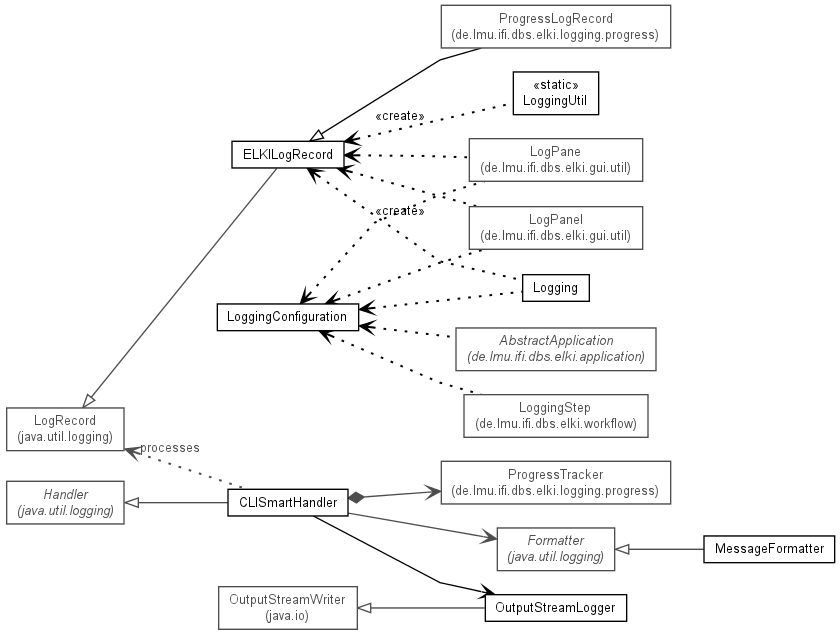| Overview | Package | Class | Use | Tree | Deprecated | Index | Help |

|

|
|||||||||
| PREV PACKAGE NEXT PACKAGE | FRAMES NO FRAMES | |||||||||
See:
Description

| Class Summary | |
|---|---|
| CLISmartHandler | Handler that handles output to the console with clever formatting. |
| ELKILogRecord | Base LogRecord class used in ELKI. |
| Logging | This class is a wrapper around Logger and
LogManager offering additional convenience functions. |
| LoggingConfiguration | Facility for configuration of logging. |
| LoggingUtil | This final class contains some static convenience methods for logging. |
| MessageFormatter | A formatter to simply retrieve the message of an LogRecord without printing origin information. |
| OutputStreamLogger | Class to write to Output Streams, IGNORING OutputStreamLogger.close(), with a special
newline handling and always flushing. |
Logging facility for controlling logging behavior of the complete framework.
Logging in ELKI is closely following the Logger approach.
However, system-wide configuration of logging does not seem appropriate, therefore ELKI uses a configuration file named
logging-cli.propertiesliving in the package
de.lmu.ifi.dbs.elki.logging (or an appropriately named directory) for command line
interface based operation.
Logging levels can be configured on a per-class or per-package level using e.g.:
de.lmu.ifi.dbs.elki.index.level = FINE
to set the logging level for the index structure package to FINE.
Developers working in ELKI are encouraged to use the following setup to make configurable logging:
Introduce one or multiple static final debug flags in their classes:
protected static final boolean debug = true || LoggingConfiguration.DEBUG;
After development, it should be changed to false || .LoggingConfiguration.DEBUG
If the class contains 'frequent' logging code, acquire a static Logger reference:
protected static final Logging logger = Logging.getLogger(Example.class);
Wrap logging statements in appropriate level checks:
if (logger.isVerbose()) {
// compute logging message
logger.verbose(expensive + message + construction);
}
For infrequent logging, the following static convenience function is appropriate:
LoggingUtil.exception("Out of memory in algorithm.", exception);
This function is expensive (it acquires a stack trace to obtain class and method references, retrieves a logger reference etc.) and thus should only be used for 'rare' logging events.
In cases where many tests would occur, also consider using:
final boolean verbose =logger.isVerbose(); // ... for, while, anything expensive if (verbose) {logger.verbose(...); }
|
|
|||||||||||
| PREV PACKAGE NEXT PACKAGE | FRAMES NO FRAMES | |||||||||||